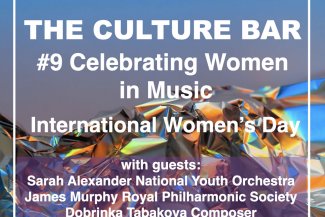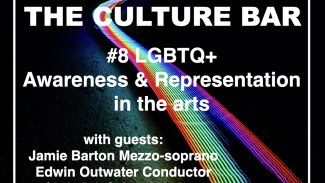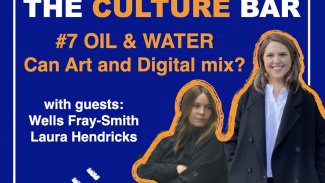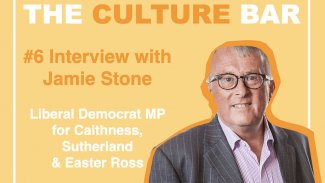THE CULTURE BAR NO.9: UNDER THE SPOTLIGHT — CELEBRATING WOMEN IN MUSIC
2/3/2021

Under the spotlight mini-series episode
In this special podcast episode, we celebrate International Women’s Day (8 March 2021).
An episode not only celebrating the achievements of women in music, but also music itself, and all of those who are engaged with it and making the effort to take it out of any one particular box.
In this lively conversation, we are excited to be joined by three knowledgeable and passionate panellists:
Dobrinka Tabakova – a multi-award-winning composer born in Bulgaria who has lived in the UK for over 25 years. As well as writing extensively for the concert hall she has also composed for film and dance projects – and amongst her commissioners are the Royal Philharmonic Society, BBC Radio 3 and the European Broadcasting Union. Her music is performed worldwide – and her debut profile album String Paths, on ECM Records, was nominated for a Grammy in 2014. In 2017 she was appointed composer-in-residence with the BBC Concert Orchestra.
Sarah Alexander – Chief Executive and Artistic Director, National Youth Orchestra of Great Britain, named Orchestra Manager of the Year in the 2015 Association of British Orchestras/Rhinegold Awards and awarded an OBE in the 2018 New Year’s Honours list. When accepting that award Sarah spoke of the NYO being unique. Through the groundbreaking initiatives brought in under Sarah’s stewardship, its teenage musicians have continued to share their knowledge and love of orchestral music with thousands of other teenagers, both encouraging others musically and bringing musical inspiration directly into the lives of many who may never have heard a live orchestra before.
James Murphy – Chief Executive, Royal Philharmonic Society – before that he was Managing Director of Southbank Sinfonia, and previously Communications Director at NYO. He made Southbank Sinfonia the first UK orchestra to hire an equal number of male and female guest conductors and substantially raised the proportion of music is performed by women. His advocacy for gender equality continues at the RPS whose Women Conductors programme has given over 500 women the chance to try their hand and further their skills at conducting.
This episode is hosted by HP’s Lydia Connolly, Director and Head of Artist Management at HarrisonParrott.
Useful links and resources
Connect with Dobrinka:
Website: dobrinka.com
Instagram: instagram.com/dobrinka_tabakova
Facebook: facebook.com/DobrinkaTabakovaComposer
Connect with Sarah:
Website: nyo.org.uk
Ode to Joy project: nyo.org.uk/ode-to-joy
Instagram: instagram.com/nyo_gb
Twitter: twitter.com/NYO_GB
Facebook: facebook.com/NYOGB
Connect with James:
Website: philharmonicsociety.uk
Twitter: twitter.com/RoyalPhilSoc
James Recommends:
Daffodil Perspective: thedaffodilperspective.com
Donne UK: donne-uk.org
This is the second episode in our ‘Under the Spotlight’ podcast mini-series where we shine a light on ‘challenging’ topics in the arts, and focus on guests living these experiences and who are working to create change in the sector.
The Culture Bar is a podcast series created by HarrisonParrott focussing on conversations in culture and the arts.
Find us on Spotify, iTunes, Google Podcasts, YouTube, Podbean, Deezer and all good podcatcher sites.
Use #theculturebar or follow us on Twitter @_TheCultureBar to keep up with our latest releases
A special thank you to Robert Cochrane as the composer of the theme tune music, and Merlyn Thomas our editor.


